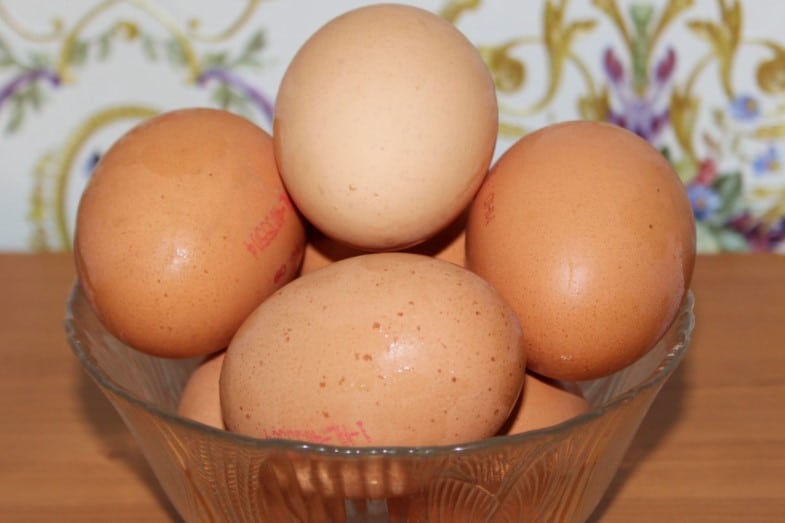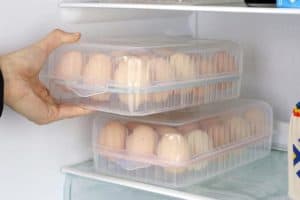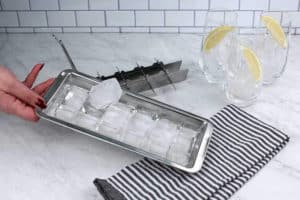How long do hard-boiled eggs last unrefrigerated? Hard-boiled eggs are a great snack on the go. But it’s important to know how long they will last out of a fridge. In this article, I will describe how long hard-boiled eggs last unrefrigerated and important food safety tips.
How long will hard-boiled eggs last unrefrigerated? Hard-boiled eggs last unrefrigerated, at room temperature, for about 2 hours, according to the USFDA (U.S. Food and Drug Administration). If the room is warmer, or you bring the eggs outside on a warm day, they could last as little as one hour.
If you leave hard-boiled eggs unrefrigerated for extended periods of time, harmful pathogens, including Salmonella, will rapidly multiply inside them. If it has been longer than two hours, it is safer to discard the egg rather than risk your health.

Read on to learn more about how long hard-boiled eggs last unrefrigerated, as well as how to check if they have gone bad.
How Long Do Hard-Boiled Eggs Last Unrefrigerated?
Generally speaking, keeping raw and boiled eggs at room temperature for a couple of hours is safe. You likely won’t get stomach problems if you consume them within two hours.
But anything longer than two hours increases the risk of bacterial growth. Although eggs with their shells intact have certain protection against pathogens, they are still susceptible to bacterial growth if you leave them out in the open for too long.
Bacteria multiply rapidly at temperatures between 40°F and 140°F (4.44°C to 60°C). If you leave boiled eggs out in the open, it doesn’t necessarily mean that bacteria will immediately grow upon them. But it increases the risk.
It is possible to leave eggs, raw or cooked, out of the fridge for one day, and they may not be problematic. But it’s also possible that they may cause stomach issues. You can’t be really sure, so it is better to err on the side of caution. Store them in the fridge, particularly if you don’t want to consume them right away.
According to the USFDA (U.S. Food and Drug Administration), every year, there are about 79,000 people who suffer Salmonella-related diseases from the eggs they eat. It’s not certain how many of these people have eaten spoiled hard-boiled eggs.
To be safe, it is a good idea to not leave hard-boiled eggs peeled or unpeeled, unrefrigerated for more than 2 hours.
How to Check If Hard-Boiled Eggs Have Gone Bad?
When you boil eggs, their shelf lives get even shorter. What’s the reason? When you boil eggs, it will remove the protective covering or outer layer of their shells. It makes the shell vulnerable to outside elements, such as the air, bacteria, and other harmful microbes.
The shells of hard-boiled eggs become even more porous. But there is still an outer layer left to protect the eggs. If you leave their shells intact, hard-boiled eggs can last around seven days inside the refrigerator. Peeled hard-boiled eggs will only last about five days in the fridge.
You should immediately chill eggs right after boiling them. To do this, transfer the newly boiled eggs to a bowl of ice water and then put them inside the fridge. The temperature in the fridge should be kept constant. If not, the eggs will still go bad.

Egg Odor
How can you tell if hard-boiled eggs have already gone bad? If you start smelling bad odor coming from them, they have already turned bad. In peeled, cooked eggs, the odor is typically rotten or sulfurous. You may have to crack open the shells of hard-boiled eggs to notice a change in their odor.
Yolk Color
Some believe that eggs have gone bad if the color of their yolks has turned green or gray. In reality, cooking time generally affects the resultant color of the yolk. Perfectly cooked hard-boiled eggs have yolks that have deep yellow to golden colors. Their texture is also creamier.
The longer you cook the eggs, the paler the yolks become until they turn grayish or greenish. Their texture will also become chalky and not creamy. The yolks turn gray or green because of the chemical reaction that goes inside the yolks. But they are still safe to eat, although they may not be pleasant to taste.
Egg Sweating
Another sign that’ll tell you if the hard-boiled eggs have already gone bad is when they start to sweat. A sulfuric smell will accompany this sign. When you observe these signs, discard the eggs so other people won’t eat them.
Factors That Determine How Long Hard-Boiled Eggs Last Unrefrigerated
A number of factors affect the shelf life of hard-boiled eggs if you leave them at room temperature. Normally, they begin to spoil after two hours from the time of boiling. Here are some factors that may reduce the two-hour mark.
1. How They Are Handled
When properly handled, they should last two hours in the open. However, if they become contaminated at some point during the process, the eggs could spoil much faster.
2. The Temperature Where They Are Left in the Open
If the room temperature is warmer than usual, spoilage of the hard-boiled eggs will accelerate.
3. The Expiry Date of the Eggs
Eggs from the grocery store usually have their “best before” dates. If you cook the eggs near to their “best before” time, they will spoil much faster if you leave them out at room temp.
4. Peeled or Unpeeled Eggs
Unpeeled boiled eggs still have their shells intact, so they still have an additional layer of protection. Peeled hard-boiled eggs no longer have their shells on and are more exposed to the elements; therefore, they can spoil much faster than unpeeled cooked eggs.
How Long Do Hard-Boiled Eggs Last If Refrigerated?
If refrigerated, hard-boiled eggs will last around seven days. This is especially true for eggs boiled for at least 10 minutes. Eggs boiled less than 10 minutes will have reduced shelf life. However, if you don’t handle boiled eggs properly, they can spoil easily.
You can store hard-boiled eggs inside the fridge unpeeled or with their shells intact. If you crack them open and peel off their shells, they will last around five days. But if you store the eggs in the fridge with their shells still intact, they can last about seven days.
We’ve answered the question, “How long do hard-boiled eggs last unrefrigerated?”; next, let’s look at the proper storage and handling of hard-boiled eggs.
How Can You Properly Store Hard-Boiled Eggs?
To keep hard-boiled eggs safe to eat, you should store them at temperatures no lower than 40°F (4.44°C) or even colder. Follow this rule, whether you have peeled or unpeeled boiled eggs. The same rule applies to raw eggs too.
If you do not consume hard-boiled eggs immediately, you need to store them in the fridge. However, if you store them improperly, you can’t extend their shelf lives as much as you want to. So, it would be best if you stored them properly. To be able to do this, you can consider these tips:
1. Store Them Immediately after Cooling
After boiling, don’t wait for many hours before putting them inside the fridge. Immediately after the eggs have cooled down, place them inside the refrigerator.
2. Don’t Put Them on the Fridge’s Egg Tray
If your fridge is the standard type, its egg tray is located at the door. This section of the fridge is often subjected to frequent temperature changes because of the door’s frequent opening and closing.
So, instead of the door, place the hard-boiled eggs at the back end, middle rack of the fridge. This fridge area holds a constant and stable temperature. It is the place where you can extend the shelf life of your hard-boiled eggs.

3. If Unpeeled, Place Them in Their Original Carton
If the hard-boiled eggs are still in their shells, place them inside their original package. Then put them inside the fridge. (So, don’t throw the package from the grocery store if you intend to cook hard-boiled eggs).
If peeled, place the hard-boiled eggs inside a sealed container before putting them inside the fridge.
4. Pickle the Hard-Boiled Eggs
Pickling is another way of effectively storing your hard-boiled eggs. It is a method of preserving and extending the shelf life of food. This method is done through immersion in vinegar or anaerobic fermentation using salt or brine solution.
This process will not give room for bacteria to grow and multiply while storing hard-boiled eggs. You can store the eggs in covered glass jars and place them inside the fridge.
5. Freeze Your Hard-Boiled Eggs
You can also freeze your hard-boiled eggs, but only their yolks. Of course, you can also freeze boiled egg whites. But when you are ready to eat the egg whites, you will find that they are rubbery and not pleasant to eat. The whites will also get discolored when you thaw them. Freezing won’t change the texture of the yolks.
After boiling the eggs, peel their shells, open them up and separate the egg yolks from the egg whites. Place the hard-boiled egg yolks in an ice cube tray. Apply small amounts of oil on the tray to prevent the yolks from sticking to the container.
Freeze the egg yolks immediately to prevent contamination. You can also use a zip-lock plastic bag if you don’t have an ice cube tray. Write the freezing date on the side of the tray or plastic bag. Proper labeling will help you track the number of days the egg yolks are in the freezer. Consume frozen eggs within three months.
Is It OK to Freeze Hard-Boiled Eggs?
If you have unrefrigerated hard-boiled eggs that are nearing 2 hours, should you freeze them to make them last longer?
While you can freeze whole hard-boiled eggs, it is not advisable. If you freeze hard-boiled eggs, they will lose all their moisture content. Soft-boiled eggs have some moisture left in them. But when you take cooked eggs out of the freezer and thaw them, you will find that their taste and texture will be odd.
Their yolks may be crumbly, and their whites may be rubbery. Along with their odd taste, you will not enjoy eating them. If you are thinking of freezing cooked eggs as advanced meal preparation, don’t.
Are Hard-Boiled Eggs Safer than Raw Eggs?
Some believe that since you have boiled the egg, it is now much safer than raw eggs. They also conclude that you can store it longer than raw eggs. Unfortunately, this is a wrong assumption.
The Academy of Nutrition and Dietetics says that hard-boiled eggs are, in fact, more susceptible to contamination of harmful microorganisms. When you boil eggs, the protective layer of their shell is damaged. Therefore, you should refrigerate eggs after boiling them, just like raw eggs and other egg products.
Not all bad eggs emit a foul odor too. The safest way of handling eggs is to practice proper food safety. Cook the eggs until their whites and yolks are firm. If you want to serve deviled eggs at your party, place them on a serving platter with ice on them.
Ice will keep the eggs cold and prevent bacteria from multiplying. So, try setting a timer to remind you to refrigerate unconsumed hard-boiled eggs if they are nearing their two-hour mark. If you forget the timer, throw the eggs out, or you will earn the ire of your guests.
Conclusion – How Long Do Hard-Boiled Eggs Last Unrefrigerated?
So, to recap, how long do hard-boiled eggs last unrefrigerated? Hard-boiled eggs can last for two hours. This is according to the USFDA.
If you leave hard-boiled eggs at room temperature, the maximum length of time before they expire is two hours. However, if it is an overly warm day and you forgot to put them inside the refrigerator, they could only last in as little as one hour.

![How Long Does DayQuil Last? [How Long It Stays in Your System] how long does dayquil last](https://howchimp.com/wp-content/uploads/2021/06/how-long-does-dayquil-last-300x200.jpg)
![How Long Does DHL Take to Deliver? [DHL Delivery Time] How Long Does DHL Take to Deliver](https://howchimp.com/wp-content/uploads/2021/05/how-long-does-DHL-take-to-deliver-300x200.jpg)

![Read more about the article How Long Does Soup Last in the Fridge? [Chicken Soup, Vegetable Soup, and More]](https://howchimp.com/wp-content/uploads/2020/11/how-long-does-soup-last-in-the-fridge-300x200.jpg)
